- Home
- Peter Lerangis
The Colossus Rises Page 3
The Colossus Rises Read online
Page 3
I wanted desperately to contact Dad. Just one phone call. I turned toward the window. The sky was brightening in the rising sun. Carefully I stood up. The pain wasn’t quite as intense as it had been. I guessed it was the sudden movement that had really torpedoed me. I’d be fine if I slowed down.
I stepped toward the window and gazed out. Before me stretched a long, grassy lawn nearly the length of a football field, crisscrossed with paths. Surrounding the lawn were old-fashioned red brick buildings, most with tidy, white-shuttered windows. They seemed old, but some of them had sections with glass ceilings. If the lawn were a clock I’d be at the bottom, or six o’clock. To the left, about nine, was a grand, museum-like structure with pillars and wide stairs, kind of the centerpiece. At around two, tucked between the red brick buildings, was a sleek glass-and-steel structure that seemed out of place. The whole thing was peaceful looking, like a college campus plopped into the middle of a jungle. Trees surrounded the compound like a thick green collar stretching in all directions as far as the eye could see. Except for the left side—west.
Way beyond the big museum building, a massive black rock mountain loomed darkly over everything. It thrust upward through the greenery like a clenched fist into the softening sky. It seemed almost fluid, changing its shape with the movement of the morning mists.
A murmur of distant voices made me look across the compound. A pair of men dressed in khaki uniforms emerged from the side of a distant building. “Hello?” I called out, but my voice was too weak to carry.
As they stepped into the dim light, I saw that both of them were carrying rifles. Big ones, with ammo.
I ducked away from the window. This was no hospital. I was in lockdown. Were these people coming for me? Already they’d kidnapped me, drilled holes in the back of my head, and stuck me in some sort of bizarre prep school with a bunch of brainwashed zombies. Why? And what were they going to do for an encore?
I made my way silently back across the room. The window on the other side had a much different view. It looked away from the campus. The only thing separating the building from the surrounding jungle was a scraggly clearing, about twenty yards of rocky soil. Beyond it was a thicket of trees. In the dawn light, the jungle looked dense and almost black. But I could see a path leading into it, and that made my blood pump a little faster. Every path had a destination. Wherever this was—Hawaii, California, Mexico, South America—there had to be a road somewhere to a town or city. Stuff had been built here, which meant bricks and materials had been trucked in. If I could find a road and hitch a ride, I’d be able to locate a pay phone or use somebody’s cell. Call Dad. Contact the news media. Report this place.
I sat on the bed and carefully put on my jeans and shoes. Then I went to the window and perched on the sill. Swiveling my legs around, I jumped out.
CHAPTER SIX
INTO THE JUNGLE
IT WAS ONLY a short drop to the ground, but in my condition, I felt like I’d landed on iron spikes.
Sucking in air, I held back the urge to scream. I pressed my hands to my head to keep my brain from bursting. I had to be careful. I’d just had surgery and was a long way from recovery. Even just looking left and right hurt.
There wasn’t much back here: a scraggly yard of trampled soil and grass, some truck tire marks, a Dumpster. I was alone, and no one was coming after me.
Go. Now.
Each step felt like a blow. My ears rang. The distance from the window to the jungle felt like a mile. I was in full view of the windows on this side of the building. If anyone saw me and told Conan, I would be toast. Try as I might, I just couldn’t go very fast.
But as I stepped into the narrow path, I heard no alarm, no voices. Only the cawing of birds, the rustling of branches and leaves. An animal skittered through the grass, inches beyond my toes, barely making a sound.
Focus.
I hobbled as fast as I could. The adrenaline was pumping now, making me less aware of the pain in my head. The path wound around narrow gnarled trees. Thorns pricked my clothing and vines whipped against my face. The air was tinted orange in the rising sun, and droplets of dew sat like glistening insects on the leaves.
I don’t know how long I trudged like that—a half hour? an hour?—before all traces of coolness had burned off. My clothes were soaking wet with sweat and dew. Flies swarmed around my neck and ankles. I was slowing.
When my foot clipped something hard and sharp, I went down.
I let out a wail. Couldn’t help it. I took a deep breath to avoid blacking out. I had to will my clenched jaw open, to keep from shattering my own teeth. My eyes were seeing double, so I forced them to focus on where I’d tripped. It was a flat, disk-shaped rock, hidden by vines until my foot had torn away the greenery. A snaky line had been carved into the top.
I pulled away more vines. The rock was about the size of a manhole cover, covered with a blackish-green mold. But the carving was clear—a crude rendition of a slavering beast, a frightening eaglelike head with fangs.
It looked a lot like my Ugliosaurus.
This was freaking me out. I felt like someone was taunting me. I had to keep it together. There were carvings of mythical beasts all over the world—dragons and such. The kind of stuff that ends up in the museums of natural history. I didn’t care about that.
Look forward. Eyes on the prize.
The path was becoming narrow and choked. To my right, the black-topped mountain loomed over the trees. It seemed to be staying exactly the same size, which probably meant it was farther away than I thought. How far—maybe a mile, two? I felt like I was going nowhere.
I vowed to keep the mountain in sight, always to my right. That way my path would be straight. But straight to what? What if the next village was a half continent away? I had no idea how to survive in the wilderness—except from reading Hatchet and My Side of the Mountain, and I barely remembered those.
As I plodded on, the day grew darker. The thickening canopy blotted out sunlight like a vast ceiling. My ankle ached from the fall and my hands were bloodied by thorns. Overhead, caws and screeches rang out like playground taunts: Check it out! New prey! It can barely walk! The woods seemed to be closing in, dense and alive, rustling with the wind. Or maybe not the wind. Maybe hawks or a nearby pack of pumas or an angry cannibalistic tribe—or all, jockeying for position. First come, first served. A shadow passed and a buzzard landed on a branch above me, cocking its head expectantly.
“Not dead!” I called up. “See the moving mouth? Not! Dead!”
It didn’t budge a millimeter. It was waiting. Birds were smart. They knew where to find dinner. They could tell when someone was about to be killed.
My resolve was crumbling. I’d gone from get-me-out-of-here to what-was-I-thinking. Suddenly the idea of a zombie prep school didn’t seem so bad.
Time to bail.
But as I turned, I felt my heart drop like a coconut. I saw no trace of a path. The compound had long been swallowed up by the trees. The mountain was invisible behind the greenery.
The sun and the mountain. Those were the things that gave me direction. But I couldn’t see either one now.
“Help!”
My cry sounded puny in the wild-animal chorus. I stood, hoping that would help me get some more volume. “Help me!”
The buzzard fluffed out its feathers.
That was when I caught the hint of a breeze. It tickled across my nose and pricked me with a summer memory—the deck of a ferry, a Nantucket shack with Mom and Dad, air so damp it glued envelopes closed.
I may have been from Indiana, but I knew the smell of the sea. Sea meant shore. A shore was a path along water. I could follow it to a port. Swim if I had to. Signal to a passing ship.
As I moved in the breeze’s direction, I came across a pile of charred branches and vines. Excellent. With dry tinder, bright sun, and a piece of flint, I could start a fire and send up smoke signals. I gathered some of it, used my shirt as a sack, and slung it over my shoulders.
r /> I forged on, feeling stronger. I was going to make it! I thought about returning home. Dad would be so freaked. He’d get a job in town and never leave home again. We’d work together to expose this place. My brain would recover from whatever these people had done to it.
My head had stopped pounding. The ringing in my ears was totally gone.
Unfortunately, so was the sea smell.
I stopped. I hadn’t been paying attention. I sniffed left and right. I sniffed until I had to sneeze. But I had lost the scent. Completely.
I thought of retracing my steps, but they’d vanished in the underbrush. Looking desperately around, I saw a gap between trees. Animal droppings. The possibility of a path. In the distance I thought I could see a tiny, bright glint. The reflection of the sun against water?
My heart raced. I hurried toward it, thrashing through the thick brush.
And then something fell from the sky.
“EEEEEEEEEEE!” With a piercing scream, it hurtled into my path. I sprang backward. As it leaped toward me, I could see a set of knifelike teeth and bright red gums.
A monkey landed on all fours and stood chattering angrily. In one hand it held some half-eaten fruit. In the other it was jangling something metallic.
A set of keys.
I rubbed my eyes. I was seeing things.
The monkey didn’t seem to want to attack. Instead it turned its back and walked into the woods. I watched it go, feeling as if my beating heart would burst out of my chest. Just as I’d gathered myself, the monkey popped out again, scolding me. Waving into the jungle.
“You…you want me to follow you?” I said.
“EEEEEEEEE!”
I took that for a yes.
I tried to obey, but the thing was much slipperier than I was. It would disappear into the brush and then emerge exasperatedly with its hands on its little hips. Ahead, I saw the bright glow of a clearing—and the glint again. We were approaching it from a different angle. It wasn’t water. It was something in the middle of a jungle clearing, something metallic or glass.
I picked up the pace, sweeping away thatches of thorny vines. And then I saw it.
A helicopter.
I figured it had crashed long ago, a relic from some war. But as I neared, I saw it looked new and was standing intact. The words KARAI INSTITUTE were emblazoned on the side in purple letters.
KI—the same initials that were stamped on my shirt and the banner in my room. I had no idea what Karai meant. But “institute”? You didn’t call a hospital an institute. Some kind of laboratory, maybe. A place where smart people got together to have smart ideas. What was I doing there? Was I some kind of specimen?
I approached warily. The monkey had dropped the keys on the ground by the helicopter’s door and was jumping around, hysterically excited.
“What do you want me to do?” I asked. “Fly it?”
The monkey clapped its hands and danced.
The only chopper I’d flown was in a video game. I escaped in order to get help, not get myself killed. Maybe there’d be something inside that could help—a map, a radio, a GPS device. Limping forward, I picked up the keys. “Thanks, bud. If I get out alive, I’m sending you bananas.”
I grabbed the handle by the helicopter door and pulled myself up. Standing on the platform, I carefully pulled the door open.
And I nearly fell back onto the ground.
In the driver’s seat was an enormous man in a short-sleeved shirt. His legs were crossed, revealing the thick, blackened sole of a bare foot. His arm showed a tattoo of the letters KI, made of intertwined snakes. As he turned with a sigh, a pair of steely green eyes peered out from a familiar, scarred face.
I said the only words my brain would allow. “I know you.”
Red Beard grabbed me by the arm and pulled me upward. With his other hand, he swiped the keys from my grip.
“Next time,” he said, “I shoot that chimp.”
CHAPTER SEVEN
YODA IN TWEEDS
I DIDN’T STAND a chance. Red Beard’s hands were like steel bands. He hefted me up into the chopper in one effortless swoop. The movement was so jarring and such a shock to my fragile system that I blacked out.
When I came to, we were rising high above the jungle to a chorus of simian screeches. I tried opening my eyes but even the light hurt. My brain felt as if someone had pumped it full of air.
“Seat belt,” the man grunted.
The chopper’s blades were deafening. I was going back. Back to the institute. Taken by the same man who had injected me with who knows what while he posed as a priest. He had walked past my house on bare feet. Now he was wearing earphones, moving the controls and humming tunelessly to himself. His eyes were bloodshot, his face haggard.
I tugged on his shirt to get his attention. “Take me home!”
“Hunh?” He turned, a little startled, as if he’d already forgotten I was there. Pulling off the left side of his earphones, he said, “Can’t. Got to go back. Seat belt!”
My sight was slowly clearing, the pain in my head subsiding. What was he doing here—in the middle of a jungle? What had he been doing in front of my house…at the hospital?
What was going on?
“You…you injected me…” I said.
He shrugged. “Job.”
“Why?” I said. “Why do you want me?”
“Do what I’m told,” he replied.
“What’s the Karai Institute?” I pressed.
“Bosses,” he said, as if it were the most obvious answer in the world.
I gazed out the window. Off to one side, the mountain was like a black wound. In the distance, the sea stretched out in a silvery sheet. I could see where the helicopter had been waiting. The spot was surrounded by acres and acres of jungle. What were the chances I’d walk right to it?
“So…you were just waiting at some random place in the middle of the jungle?” I asked. “What if I didn’t show up?”
The man’s face darkened. “Blasted monkey thief!” He pulled down his arm angrily and the chopper swooped. “Stole keys!”
My eyes slammed shut and my stomach jumped. Do not get him angry. And do not hurl.
In a moment we were descending. I peered downward to see a round helipad hidden behind the largest building on the Karai Institute compound.
“Torquin,” the guy said.
I figured he had lapsed into Swedish. “I’m sorry?”
“My name. Torquin.”
“Oh!” I replied. “My name. Jack.”
He cocked his head curiously. “You talk funny.”
The chopper landed and I reached for the door handle. But Torquin let out a grunt and held me back.
Five uniformed workers, three men and two women who looked like the Olympic weight-lifting team, had rushed out of the building. The helicopter door opened and a gloved hand reached in. I tried to pull away, but it grabbed me tight. I heard a sharp, metallic click.
Handcuffs.
“Wait here.” In the basement of a KI building, Torquin pulled open a conference room door. Unhooking the cuffs, the guards shoved me in. The place smelled of fresh cement.
“Go,” Torquin barked. For a moment I thought he was talking to me. But the guards instantly began to grumble and leave the room. I watched them disappear into a long hallway until Torquin slammed the door shut.
He pushed me around a long, polished-wood table to the other side of the room. The place was windowless with pristine white walls, swiveling leather seats, a coffee machine, and a pile of food on the table. With his Visigoth beard, bare feet, and camo clothes, Torquin looked way out of place. “Too many people. Don’t like crowds,” he said.
“Me neither,” I agreed. “Handcuffs, too. Can you take them off?”
“Sit.” He pulled out the leather chair at the very head of the table. My eyes shot directly toward the food spread: fresh and dried fruits, doughnuts, and pastries. On top of it all was a huge, gleaming, chocolate chocolate-chip muffin. It looked awesome,
and I was starving.
As he undid my cuffs, Torquin pricked up his ears. “What’s that noise?”
“My stomach,” I said.
“Stay here,” he replied. “Eat. Professor will come.”
As he left, he grabbed the muffin off the top and inserted the entire thing into his mouth.
I hated him.
At the click of the shutting door, I began cramming doughnuts into my mouth. I chased them down with enough fresh pineapple and sliced mango to feed a small Caribbean nation.
When I couldn’t fit another crumb, I slid back into a comfy leather chair and closed my eyes. I would have fallen asleep, I think, and slept for a week straight if five seconds later, the door hadn’t flown open. This time, it wasn’t Torquin.
It looked more like Yoda in a tweed jacket.
“Well, that must have been an ordeal,” the man said in a flat, high-pitched voice. “Greetings and a cordial welcome, Jack.”
He was an older guy, short and lumpy looking with dark, wrinkled skin and a broad nose crossed with veins. His eyes were droopy and sad, and his salt-and-pepper hair seemed to have slid off the top of his head and skidded to a stop just above his ears, forming two messy thatches on either side.
He walked around behind me, leaned in too close, and peered at my head as if I were a lab specimen. Pushing a pair of thick glasses up his nose, he said, “Are we feeling all right?”
“I’m trapped in this room with you,” I said. “I was kidnapped and handcuffed. Nobody will tell me where I am or why I’m here. They took away my phone—”
“Yes, yes, that is a lot to unpack, isn’t it?” the man said, still peering at my head. “But you were hardly kidnapped. You were found wandering off into the jungle. Dear Torquin saved your life. Now please turn and let me properly see the stitches. I promise not to hurt you.”

 The Orphan
The Orphan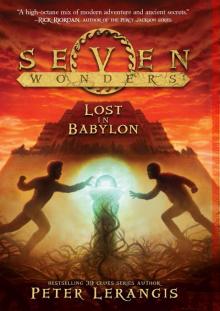 Lost in Babylon
Lost in Babylon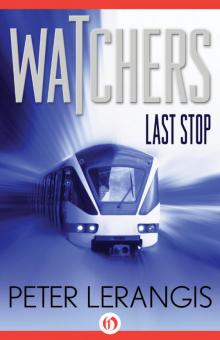 Last Stop
Last Stop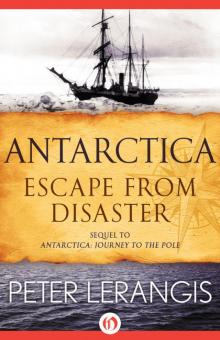 Antarctica Escape from Disaster
Antarctica Escape from Disaster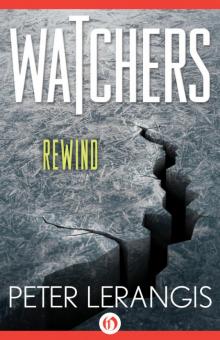 Rewind
Rewind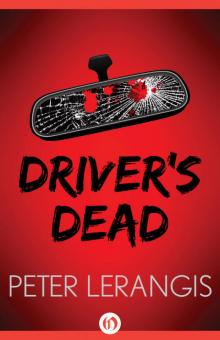 Driver's Dead
Driver's Dead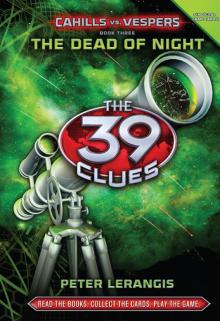 The Dead of Night
The Dead of Night The Promise
The Promise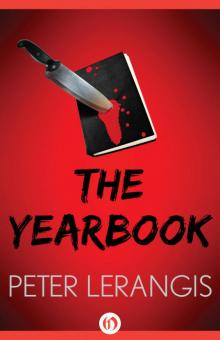 The Yearbook
The Yearbook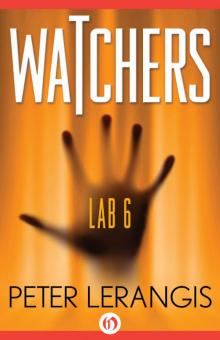 Lab 6
Lab 6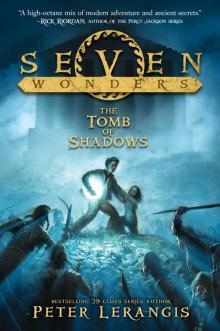 The Tomb of Shadows
The Tomb of Shadows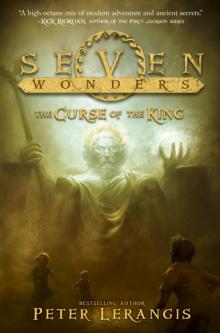 The Curse of the King
The Curse of the King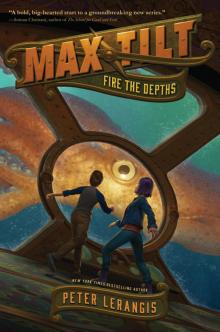 Max Tilt: Fire the Depths
Max Tilt: Fire the Depths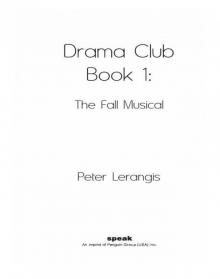 The Fall Musical
The Fall Musical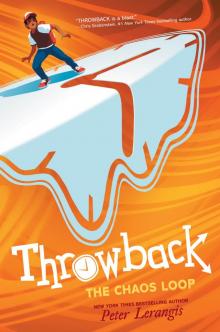 The Chaos Loop
The Chaos Loop Island
Island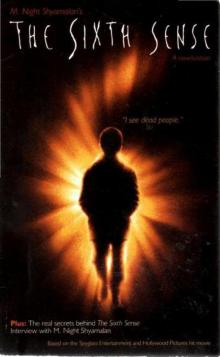 The Sixth Sense
The Sixth Sense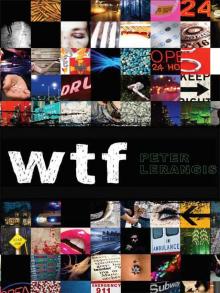 Wtf
Wtf War
War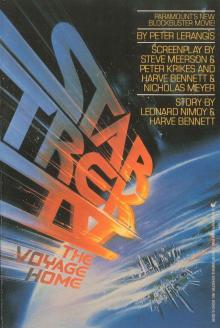 Star Trek IV, the Voyage Home
Star Trek IV, the Voyage Home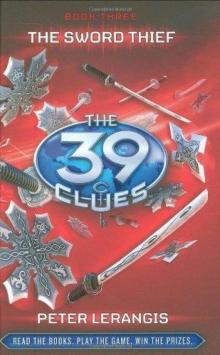 The Sword Thief
The Sword Thief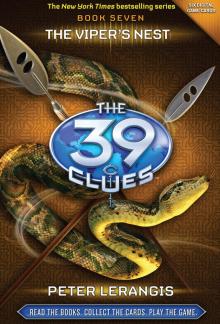 The Viper's Nest
The Viper's Nest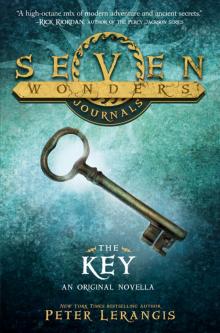 The Select
The Select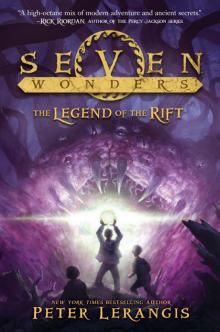 The Legend of the Rift
The Legend of the Rift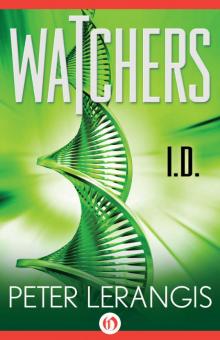 I.D.
I.D. The Sword Thief - 39 Clues 03
The Sword Thief - 39 Clues 03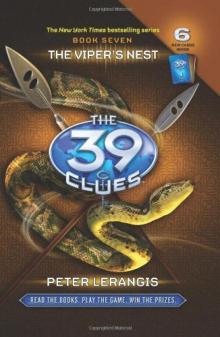 The 39 Clues Book 7: The Viper's Nest
The 39 Clues Book 7: The Viper's Nest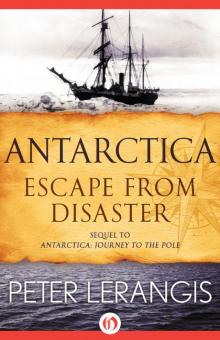 Antarctica
Antarctica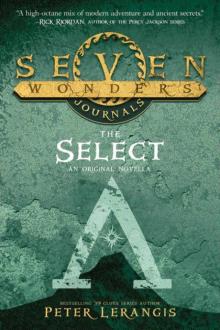 Seven Wonders Journals: The Select
Seven Wonders Journals: The Select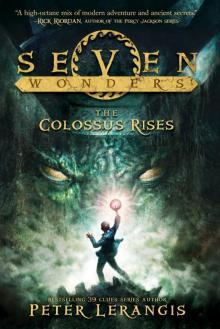 Seven Wonders Book 1: The Colossus Rises
Seven Wonders Book 1: The Colossus Rises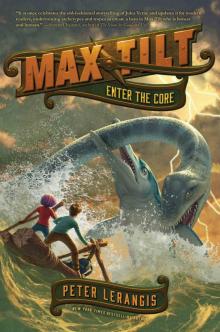 Enter the Core
Enter the Core![39 Clues _ Cahills vs. Vespers [03] The Dead of Night Read online](http://i1.bookreadfree.com/i1/04/02/39_clues_cahills_vs_vespers_03_the_dead_of_night_preview.jpg) 39 Clues _ Cahills vs. Vespers [03] The Dead of Night
39 Clues _ Cahills vs. Vespers [03] The Dead of Night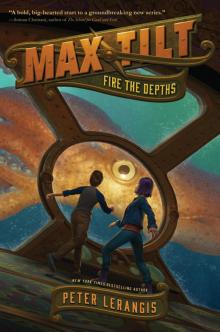 Fire the Depths
Fire the Depths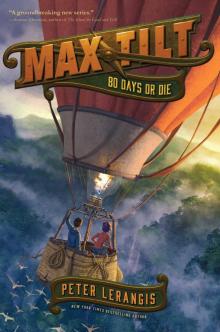 80 Days or Die
80 Days or Die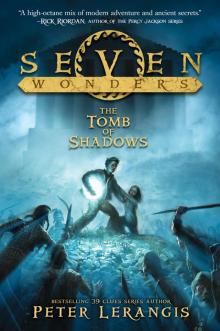 Seven Wonders Book 3
Seven Wonders Book 3